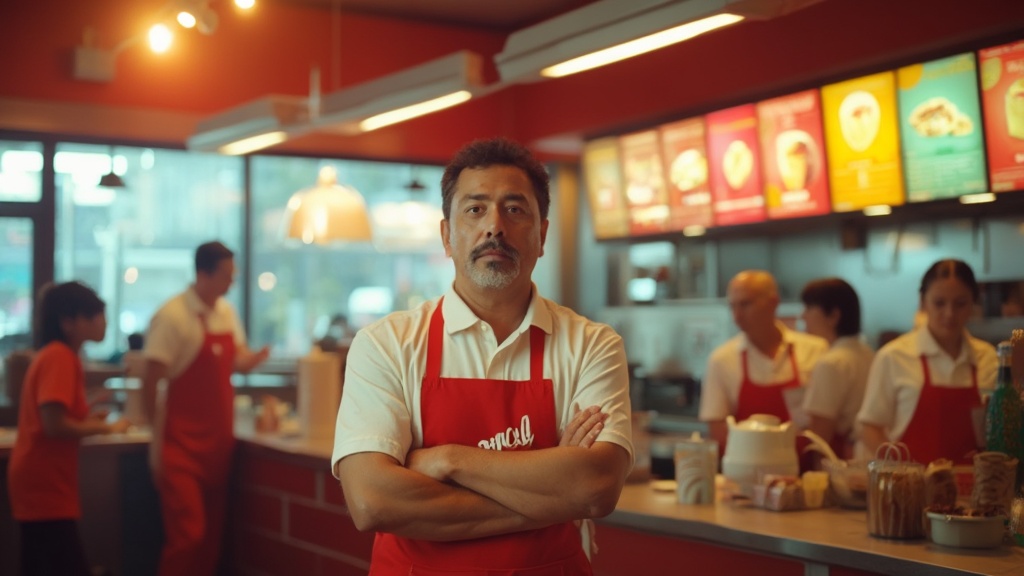Introduction
The world of food franchising offers aspiring entrepreneurs the opportunity to tap into well-established brands and proven business operations. Whether you’re considering a fast food franchise with its rapid service and convenient options or a health food franchise catering to the demand for nutritious choices, there are important factors to consider. This article provides valuable insights and guidance on understanding food franchises, the benefits of food franchising, key steps to starting a food franchise, and common challenges and considerations.
It also explores the importance of self-assessment, researching potential franchises, seeking professional advice and legal preparation, financing your franchise venture, signing the franchise agreement, undergoing training and preparation, and managing ongoing operations. With practical advice and a focus on the food industry’s enduring appeal, this article equips you with the knowledge needed to navigate the competitive landscape of food franchising.
Understanding Food Franchises
The attraction of businesses in the United States originates from their established reputation and proven operational practices. Aspiring entrepreneurs considering this path can tap into a network of recognizable names and customer loyalty built over years. Before you make a commitment to a business opportunity, it’s essential to examine the brand’s reputation, including its sales track record, growth pattern, and market coverage, whether it’s on a local, national, or global scale.
Quick-service restaurant chains, specifically, provide a distinctive business structure where franchise owners manage individual establishments, following the guidelines of the parent company. These business models stand out with their fast service, consistent menus, and convenient options such as drive-throughs, catering to a customer base that appreciates efficiency and reliability. As these establishments continue to thrive, even in the face of supply chain and labor market challenges, they offer a diverse range of culinary choices suited to various tastes.
For those interested in the healthier side of the spectrum, beginning a health-oriented business requires careful thought about what you want to provide. Evaluate the possible expenses, such as the licensing fee and the investment needed for setting up a physical site. Additionally, the Franchise Disclosure Document (FDD), updated by the Federal Trade Commission in 2007, outlines the relationship between franchisors and potential buyers, underlining the importance of thorough due diligence before diving into this venture.
It’s crucial to understand that although businesses focused on cuisine might offer appealing chances, they demand a substantial commitment in relation to time, energy, and financial means. Understanding the least profitable items on a menu, such as appetizers or vegetarian dishes, and the dynamics of menu pricing in relation to ingredient and labor costs, can be pivotal in maintaining a profitable operation. As you navigate these considerations, remember that the fast cuisine industry’s enduring appeal lies in its ability to offer affordability and convenience, continually drawing customers despite evolving market conditions.
Benefits of Food Franchising
Opting for a food franchise can be a strategic move for entrepreneurs looking to enter the culinary market with a head start. When you align with a well-known name, you tap into a legacy of success, which can include a robust sales record and a growing footprint, whether at a regional, national, or international level. This recognition is a powerful asset, as it can translate into customer trust and loyalty from day one. Moreover, being a member of a business network implies joining a system with established supplier relationships, guaranteeing that you have access to the quality ingredients or products required to maintain the brand’s reputation.
Furthermore, franchises come with the advantage of structured operational systems, developed by the franchisor to maximize efficiency and consistency across all locations. This is especially noticeable in fast food chains, where speedy service and standardized menus cater to customers’ expectations for convenience. With the fast industry maintaining its allure by offering a variety of affordable and convenient options, franchisees can leverage the enduring popularity of these models to attract a diverse clientele. Moreover, health nourishment establishments have also emerged as a profitable opportunity, capitalizing on the surge in consumer interest for nutritive choices. The secret to selecting the appropriate business opportunity, especially in the health cuisine sector, requires evaluating aspects such as company standing, growth pace, and the kind of cuisine you are enthusiastic about offering, whether it be revitalizing salads or natural, wholesome dishes.
It’s important to note that while the initial expenses, such as fees and investment in physical locations, may vary, the comprehensive support and proven business strategies provided by the franchisor can significantly mitigate the risks associated with starting a new business venture. Therefore, for business owners aiming to create an impact in the culinary sector, a licensed business opportunity provides an enticing combination of brand influence, operational assistance, and a well-established market position.
Key Steps to Starting a Food Franchise
Starting the journey of launching a food business involves more than just a passion for food; it necessitates a strategic approach to guarantee the success of your venture. The initial part of the puzzle is choosing the appropriate business model that aligns with your interests and skills, as well as the demands of the local market. An in-depth exploration of different options will unveil what sets each business apart and its attraction to the customer base. The renowned Halal Guys, for example, had a clear big idea that garnered extensive customer queues, demonstrating the importance of a unique selling proposition.
Once you’ve identified a franchise that resonates with your vision, drafting a comprehensive business plan is essential. This plan should cover a thorough market analysis, a detailed product and service list, and innovative marketing strategies. Additionally, your financial projections need to be grounded in the realities of your market and pricing strategy. For mobile kitchens, this may include considerations for ingredient costs, potential revenues from catering services, and other associated costs.
The success of a restaurant business is also heavily dependent on the layout and design of the space. The flow between the kitchen and dining areas should be seamless, ensuring efficiency and an inviting atmosphere for diners. Space allocation is critical, with industry standards suggesting around 45-60% for the dining area and about 35% for the kitchen, not forgetting the essential prep and storage areas.
Franchising, as a business model, offers numerous advantages, such as established brand recognition and a proven operational system. This is especially clear in the quick-service industry, where businesses continue to attract customers with their reliability, efficiency, and varied menu options. These elements are essential in establishing a customer experience that is both convenient and satisfying, which is evidence of the lasting appeal of quick-service chains.
In summary, as you think about your business opportunity, take into account the reputation of the brand, the initial costs of investment, and the level of assistance offered. A highly regarded franchise with a strong support system can greatly increase your likelihood of success in the competitive franchising industry.

Step 1: Self-Assessment and Concept Evaluation
When considering entering the franchising arena, it’s crucial to analyze not just your personal qualifications and financial capacity, but also the broader market landscape. For example, the global health and wellness market, valued at almost $114 billion in 2022, is projected to reach $177 billion by 2027. This strong growth indicates plenty of chances for potential franchisees, especially in the health sector. It’s advantageous to select a business model with a strong reputation, demonstrated by impressive sales growth and an extensive regional, national, or international presence.
Moreover, examining recent industry challenges can offer valuable insights. Burger King’s franchisees facing bankruptcy and the Subway sale saga reflect the importance of understanding market trends and the potential impact of economic factors on franchising. Additionally, the consumer’s sustained spending, despite economic concerns, suggests a level of resilience in the restaurant industry.
With these considerations in mind, delve into the specifics: what type of healthy nourishment are you passionate about selling? Do you envision operating a fast food business known for its convenience and standardized offerings, or perhaps a specialty health food store or juice bar that fosters community wellness? Each choice has specific expenses, including fees and the capital required for establishment.
It’s also wise to seek out the experiences of current operators. Their insights can be instrumental in assessing how well your traits and dedication align with the operational framework of the business. Ultimately, the prosperity of a business model depends on a combination of the franchisee’s qualities and their capacity to comply with the system.
In the end, the choice of a business opportunity should be a well-informed decision, integrating data on industry trends with a clear understanding of your goals and the support system provided. This strategic approach can pave the way for a rewarding venture in the thriving health industry.
Step 2: Researching Potential Franchises
Starting a culinary enterprise requires a thorough evaluation of numerous crucial elements that establish the foundation of a prosperous company. Exploring the reputation of the health food company is essential; it is recommended to select a business opportunity that showcases an admirable sales history, a promising growth path, and a notable reach that could be regional, national, or global. The allure of a recognized brand coupled with a consistent history of sales growth cannot be overstated.
A potential business owner should carefully examine the initial investment expenses, which include the licensing fee and the funds required for setting up a physical site. It is crucial to comprehend that these expenses, though fluctuating, constitute a significant portion of the financial obligation to the business model. Ongoing fees, often not as apparent as the initial costs, must also be accounted for, as they will impact the long-term profitability of the venture.
Moreover, the degree of assistance offered by the franchisor is a factor that can significantly impact the operational effectiveness and potential triumph of the business model. This includes access to proven operating systems and business processes which have been refined over time to optimize operations, curtail waste, and elevate efficiency.
For example, businesses like McDonald’s have paved the way with their robust programs, offering a combination of global brand recognition, a devoted customer base, and a reputation for substantial support. Similarly, KFC, with its expansive global footprint, presents a detailed outline of associated costs and potential profits, with initial investments ranging significantly, and a requirement for franchisees to possess a certain level of liquid personal capital.
It is essential to perform a thorough analysis of the local market, taking into account factors such as demographics, competition, and consumer preferences, in order to assess the market potential for the desired location. By requesting and examining a disclosure document, prospective entrepreneurs can delve into the average revenue and profit margins, providing a clearer picture of potential earnings.
The dedication to beginning a restaurant business is certainly significant, both in regards to time and financial resources. Nevertheless, equipped with the correct knowledge and a comprehensive comprehension of the different factors, individuals can navigate the realm of culinary enterprises with increased assurance and the possibility for triumph.
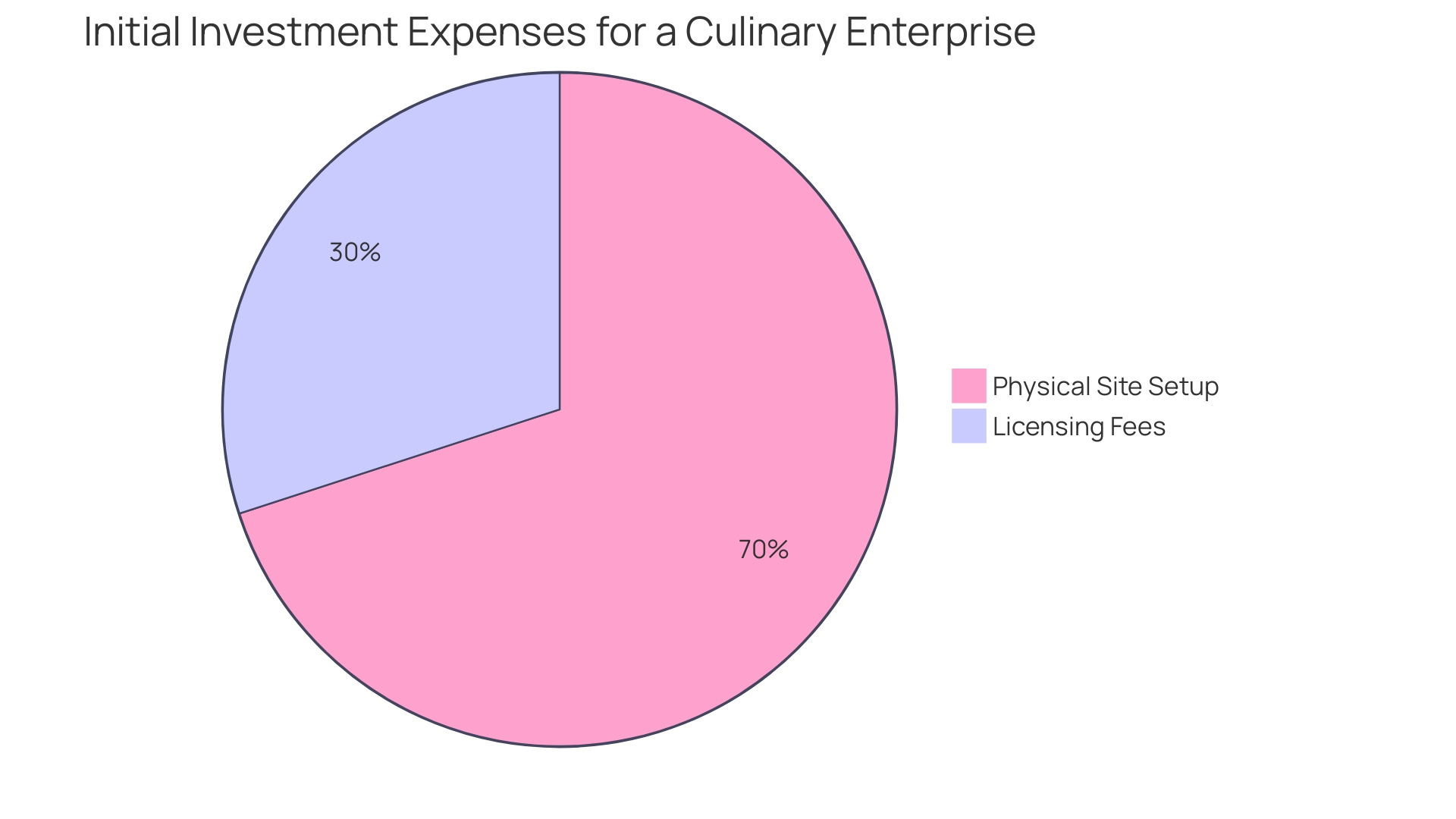
Step 3: Seeking Professional Advice and Legal Preparation
When exploring the realm of food franchising, the importance of a strong agreement cannot be emphasized enough. This legal document is not only a license permitting the use of the franchisor’s intellectual property, systems, and brand but also a safeguard for your substantial financial investment. It outlines the rights of the business partner to operate using the franchisor’s trademarks, service marks, and comprehensive branding tools, which are essential for preserving the integrity and recognition of the franchise.
Understanding this complex agreement and keeping abreast of industry changes, such as McDonald’s recent royalty fee increment, is vital. It emphasizes the significance of expert advice in examining and understanding disclosure documents, agreements, and the evolving economics of business operations. By consulting with attorneys and accountants specialized in business ownership, you can ensure you’re equipped with a profound knowledge of your rights and obligations, and that you’re compliant with the evolving regulations.
Moreover, an attorney specialized in business expansion can offer valuable insights into potential future situations that could impact your franchise, such as modifications in ownership or financial adjustments, guaranteeing that every aspect is taken into account before you make a commitment. As the business model landscape continues to evolve with technological advancements and regulatory changes, expert advice is indispensable in navigating the legal intricacies and securing the longevity of your investment.
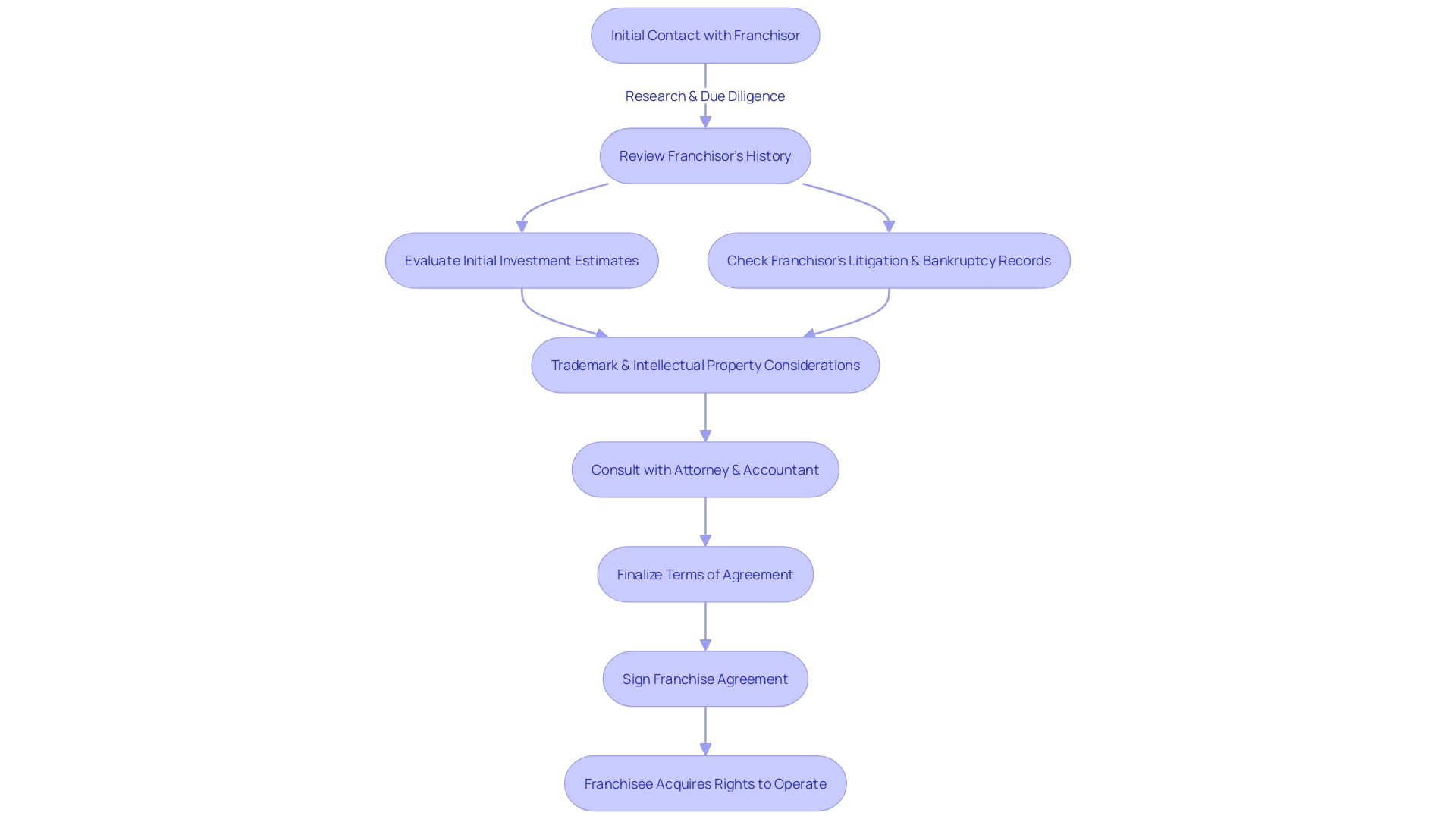
Step 4: Financing Your Franchise Venture
When embarking on the journey of starting a food business, the importance of securing adequate financing cannot be overstressed. It’s crucial to consider multiple funding avenues. Traditional bank loans might be the first option that comes to mind, but it’s worth delving into the possibilities offered by Small Business Administration (SBA) loans, which are designed to assist entrepreneurs in getting their ventures off the ground. Furthermore, establishing partnerships can provide both financial support and valuable expertise.
A solid business plan is an essential tool for persuading potential lenders or partners to invest in your business. It should outline your strategies for maintaining the growth of the business, utilizing the established brand recognition, and adhering to the proven business model provided by the franchisor. Whether you aim to sell quick-service meals, nutritious meals, or specialize in Asian dishes, your business plan must reflect a sharp understanding of the market and the distinctive offerings of your selected business.
Bear in mind, the culinary sector, especially quick cuisine, stays strong, thanks to its convenience and affordability. It’s a sector that continues to thrive, even in the face of logistical challenges, by catering to diverse consumer preferences. Hence, your funding approach should match the advantages of the culinary business model—its velocity, convenience, and extensive brand recognition. With a well-thought-out strategy and the appropriate financial support, your dining establishment has the potential to thrive in today’s competitive market.
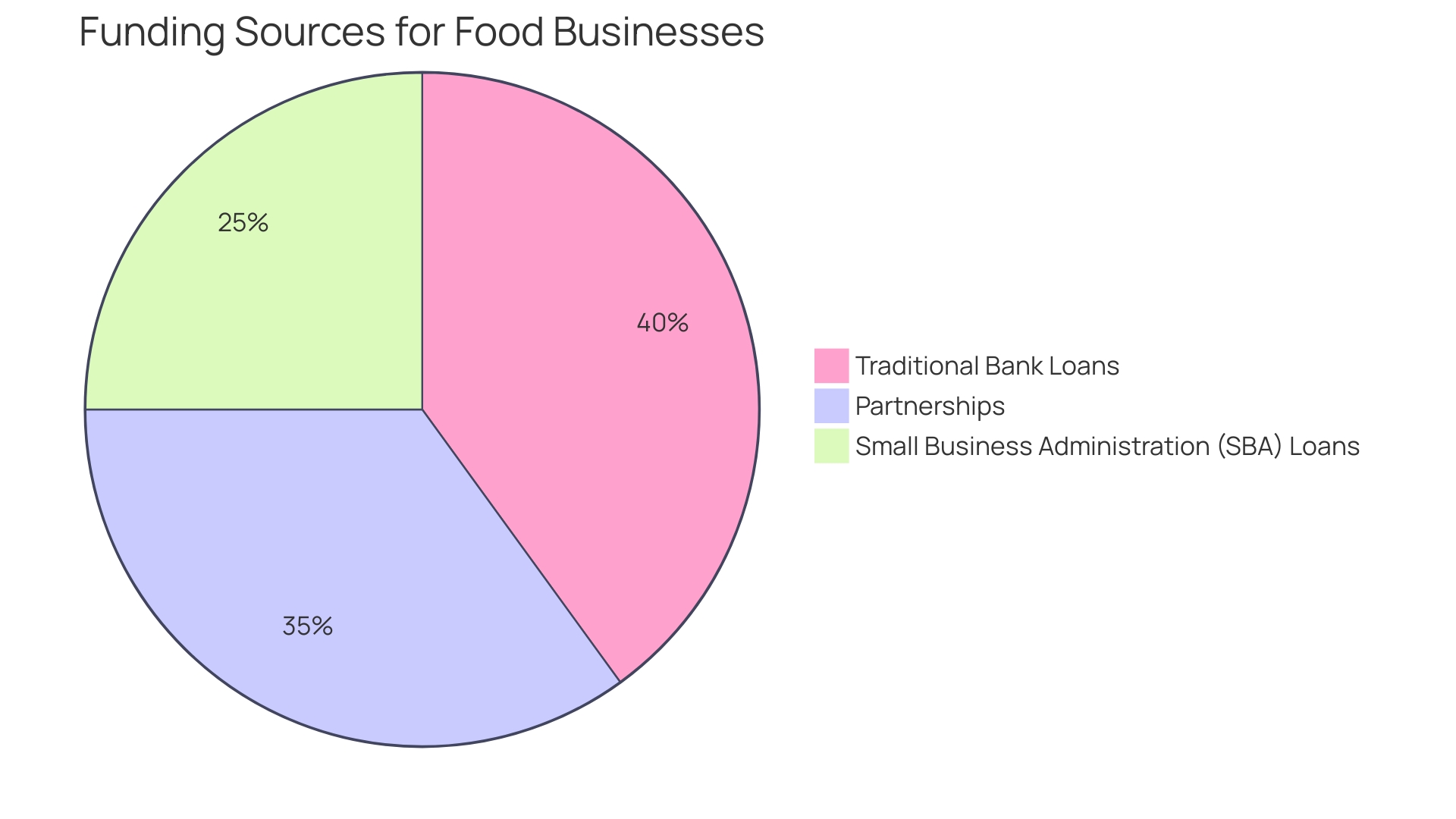
Step 5: Signing the Franchise Agreement
Embarking on the journey of a food franchise ownership involves a critical step: understanding and signing the franchise agreement. This legal document is essentially a license that outlines the franchisee’s right to use the franchisor’s name, branding, and operational systems while setting clear terms for the business relationship. The agreement outlines the franchisee’s responsibilities, including following standards and paying fees, while also allowing access to the franchisor’s intellectual property. It’s a protective measure for both parties, ensuring the franchisee’s investment is secured and the franchisor’s brand integrity is maintained. Prior to commitment, it is imperative to scrutinize the agreement, which offers a wealth of information including the franchisor’s history in litigation and bankruptcy, initial investment details, and intellectual property usage rights. This due diligence is crucial to making an informed decision in the significant financial venture of opening a restaurant business.

Step 6: Undergoing Training and Preparation
Starting the process of launching a culinary business involves fully engaging in a demanding training program carefully designed by your franchisor. This isn’t just any training; it’s a golden opportunity to imbibe the wisdom of seasoned industry experts and acquire a comprehensive toolkit to navigate the complexities of your new business. As you delve into this educational phase, it’s crucial to absorb as much knowledge as possible to ensure your franchise thrives.
From comprehending the intricacies of safety culture in the culinary industry to mastering the layout and flow of your restaurant, every detail counts. Remember, strong dedication from leaders and a thorough comprehension of consumer behavior are the foundations of a successful service venture. With the food industry being incredibly dynamic, staying informed about the latest trends, such as the surge in health food franchises or the enduring popularity of fast food chains, can offer you a competitive edge.
In addition, dealing with the monetary aspects, such as estimating startup expenses and planning your investment, is essential. It’s not just about having enough capital; it’s about strategic financial planning for sustainable growth. The culinary service industry is not just about delectable cuisine; it’s about creating an experience, a culture, and a brand that resonates with customers, all while ensuring a safe and professional environment. This pre-launch training is where you lay the groundwork for all that will follow, so take it seriously, engage fully, and prepare to bring your A-game to the table.

Step 7: Grand Opening and Ongoing Operations
As you enter the fast-paced world of franchising, the time comes to introduce your establishment to the community. A grand launch not only garners attention but also serves as the first taste of what your business will offer. In the dynamic landscape of fast food, where convenience and speed reign supreme, the success of your business depends on the consistent delivery of quality food and service. The detailed operation of your business, maintaining the elevated criteria established by the main company, which customers have grown accustomed to, contains the plan for such accomplishment. Whether it’s the swift service of a drive-through or the allure of diverse Asian flavors, the key is to maintain the harmony between the established menu and the unique dining experience of your location. Amidst the industry’s evolving challenges, such as the recent hardships faced by prominent chains like Burger King, it’s crucial to focus on quality control and operational excellence. With a thoughtful layout that ensures a smooth workflow from kitchen to table, your business can thrive by providing an exceptional experience that customers will return for. Keep in mind, the accomplishment of businesses is not only in their well-known brand but in the unforgettable experiences they offer.

Common Challenges and Considerations
Starting a food business journey means navigating a landscape filled with both opportunities and hurdles. Among the challenges, competition ranks high, as does the substantial initial capital required to start your business. Moreover, the success of a business relies on ongoing marketing endeavors and product innovation to stay current and attractive to customers.
Exploring the fast food business model reveals a system where entrepreneurs operate under a larger, renowned label, reaping the benefits of established marketing strategies and operational protocols. This model thrives on its promise of swift service and uniformity, making it a beacon of convenience for consumers.
Selecting the right franchise involves scrutinizing the company’s standing, including its sales performance and growth trajectory. A brand with a strong reputation and a history of robust sales is essential. For those inclined towards health food, pinpointing the type of fare to offer is crucial, be it specializing in salads or a broader culinary range.
It’s paramount for prospective franchisees to understand the Franchise Disclosure Document (FDD), which delineates the franchisor-franchisee relationship, emphasizing the importance of due diligence. Financial considerations are also key, with varying fees for establishing and operating your venture.
Industry experts, like Robin Gagnon, acknowledge that certain challenges such as access to capital and fiscal acumen can be significant obstacles. Nevertheless, the quick service restaurant industry continues to thrive, with chains such as KFC showcasing achievement, featuring thousands of locations globally and offering extensive economic plans for prospective business owners.
In essence, while the journey to owning a culinary business is filled with challenges, well-informed decision-making and strategic planning pave the way to potential profitability and success.
Ongoing Fees and Financial Commitments
Starting a food business opportunity involves more than just initial investments; ongoing fees such as royalties and advertising contributions are crucial to your operation’s economic well-being. When outlining your monetary projections, these recurring costs must be carefully considered. A thorough comprehension of your monetary responsibilities is crucial to maintaining your business in the long run. For example, KFC owners must navigate not only the initial investment which can span from $1.4 to $3.1 million but also prepare for continuous expenses to maintain the company’s iconic status across its global presence. In the same way, joining forces with Wendy’s business model involves becoming part of a system where more than 77% of the establishments are owned by franchisees, requiring a careful monetary plan to capitalize on the brand’s nationwide reputation. While considering the different options for a business in the culinary industry, make sure your choices are based on a thorough evaluation of both initial and continuous monetary obligations.
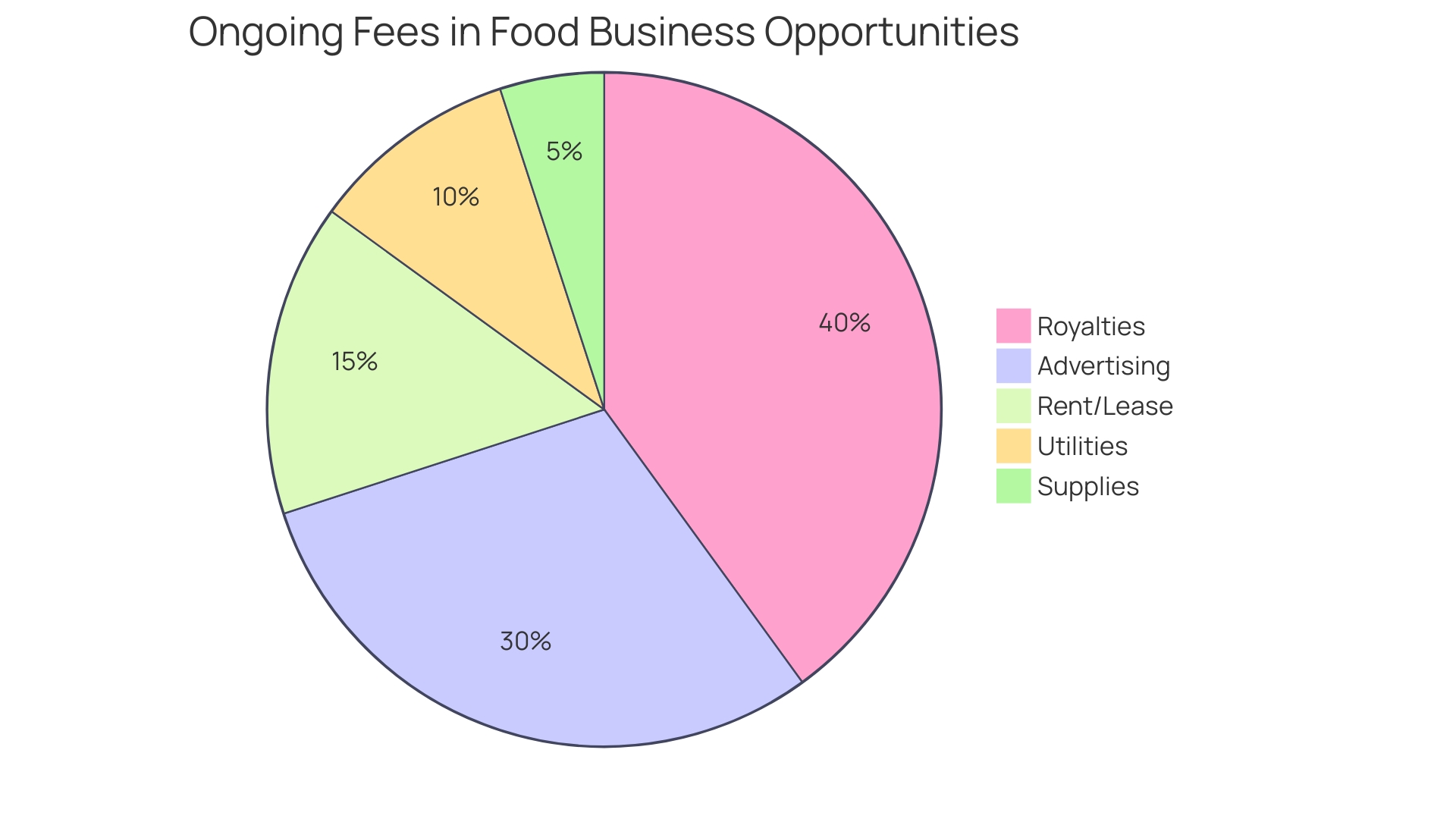
Building a Strong Franchise Business Plan
When starting a food business, building a strong business plan is essential. This document serves as the blueprint of your vision, encompassing details such as objectives, market analysis, promotional tactics, financial forecasts, and expansion strategies. For example, recognizing your target customers is just as crucial as selecting the business opportunity itself. Given the thriving nature of the fast food sector due to its cost-effectiveness and swift service, an investment opportunity in this area could be highly profitable. Yet, it’s important to consider the brand’s reputation, the fees involved, and the type of cuisine you wish to offer, whether it’s a globally recognized pizza business with an average profit margin of 15% or a health food venture with strong growth potential. Furthermore, advancements in technology are transforming businesses, and tech-savvy business models are emerging as leaders, thus expanding your range. Keep in mind, the core of a prosperous business model resides in the franchisees’ success, enabled by your careful strategizing and the franchisor’s well-established processes. With a well-designed business plan, you’re not just steering your operations towards success but also positioning your business as an appealing investment opportunity.
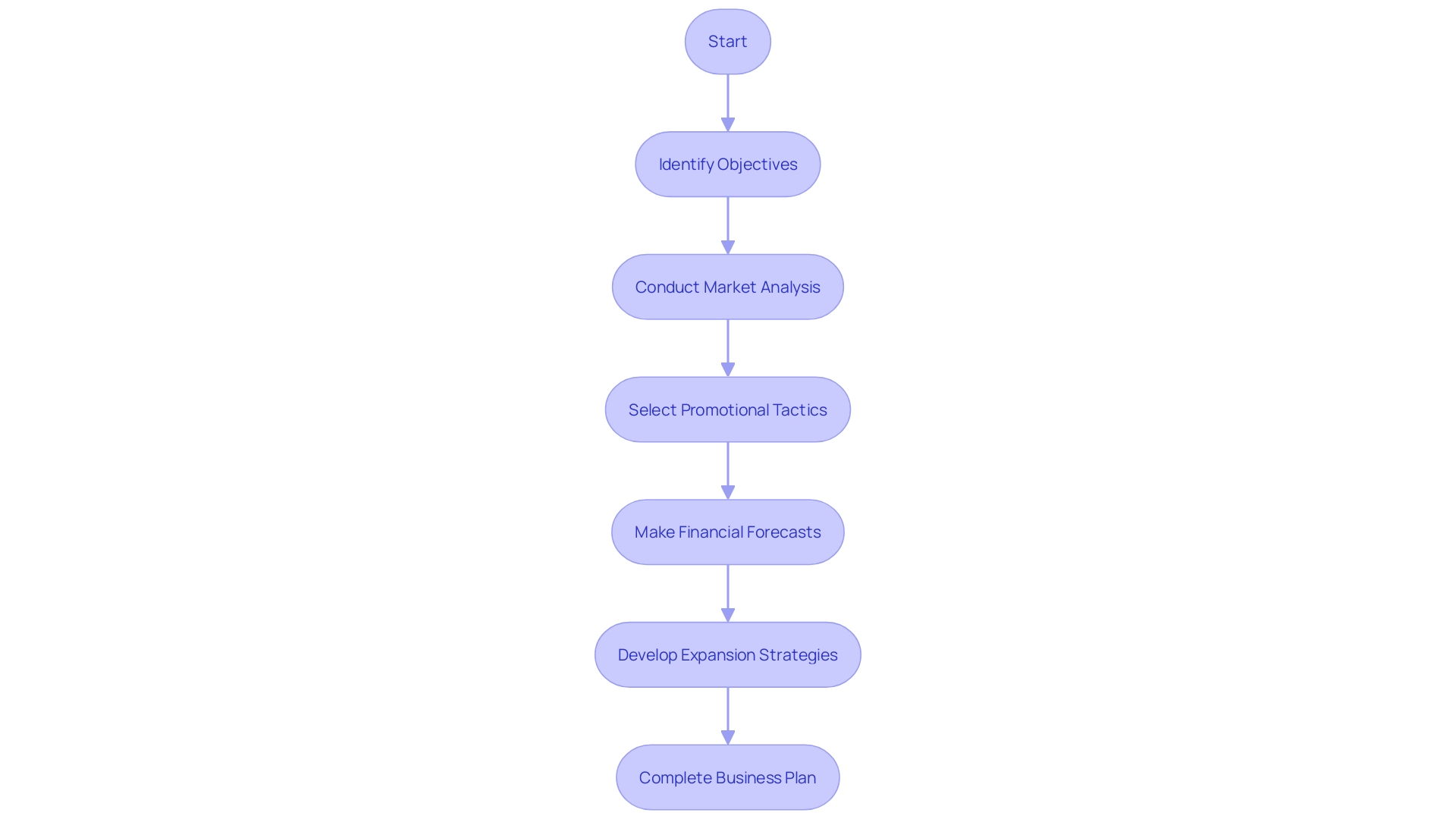
Recruiting the Right Franchise Partners
The successful expansion of a food-based business model depends on carefully selecting partners who align with the company’s values and operational standards. These partners should not only possess the expertise and background relevant to the dynamic culinary industry but also demonstrate a unwavering commitment to fostering and expanding the business.
Quick-service businesses, recognized for their efficient service, standardized menus, and convenient offerings such as drive-through and take-out, are supported by entrepreneurs who can maintain the established company image and execute the franchisor’s refined marketing tactics and operational procedures. The appeal of Asian cuisine, with its diverse range from Chinese takeout to sushi bars, has nurtured a fertile ground for business expansions. Prospective partners with a passion for Asian specialties and a commitment to providing a myriad of palatable choices stand to capitalize on this lucrative sector.
When considering a health-based business, it is essential to evaluate the company’s market standing, growth trajectory, and the breadth of its influence, whether it is regional or global. The reputation of the business for sales growth and recognition serves as a foundation for potential success. Aspiring franchisees should also ponder the specific health food niche they wish to delve into, such as organic salads or wholesome eateries, ensuring their offerings resonate with health-conscious consumers.
When considering opening a chicken establishment, it is essential to evaluate various important elements, including the reputation of the company and the initial investment needed. Support from the franchisor is paramount, offering guidance through established systems and protocols. Partners who are not only investors but truly committed to the mission and values of the organization are more likely to contribute to its success.
In the end, partners are the key elements of a business’s growth, representing the company and acting as ambassadors to the customer base. It is by means of their knowledge, commitment, and adherence to the franchisor’s vision that a business can flourish in the competitive culinary industry scene.
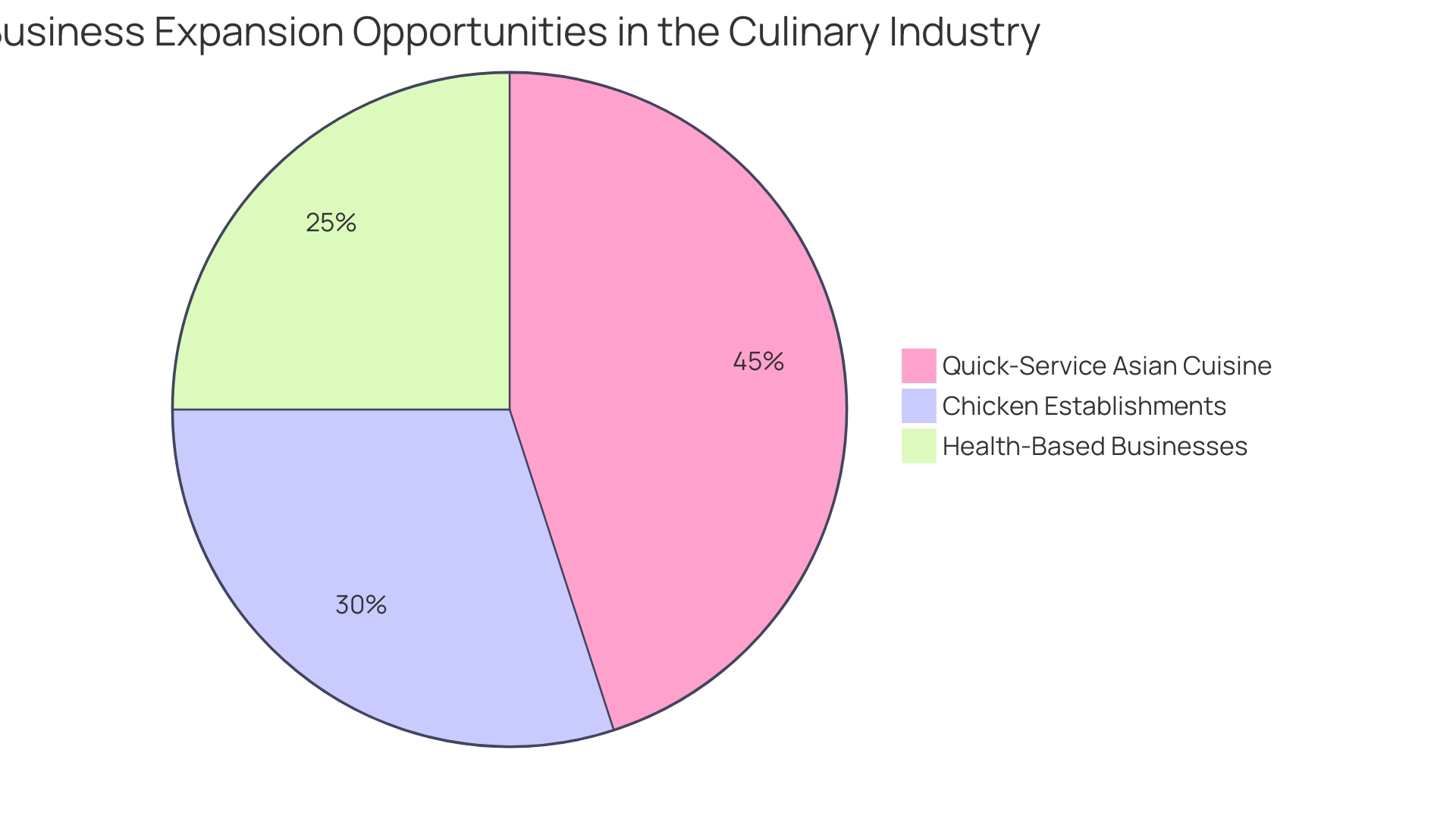
Maintaining Consistency and Quality Control
To achieve success in the food franchising industry, it is crucial to implement rigorous training programs that equip staff with the necessary skills to uphold the established standards of the company. This dedication to training not only fosters a feeling of brand integrity but also guarantees that every customer interaction embodies the value proposition of prompt service and standardized offerings. Consistency in the execution of these standards is the foundation of a business’s reputation, impacting customer satisfaction and cultivating loyalty. To maintain this consistency, a proactive approach to operational monitoring is essential. By continuously assessing the quality of service and products, operators can identify areas for improvement and implement changes swiftly, guaranteeing that the customer experience remains top-notch across all locations. This vigilant oversight is supported by advanced Learning Management Systems (LMS) that streamline access to the latest information and resources, further enhancing the efficiency and uniformity of service delivery. As the industry evolves, with factors like expanding global populations and increased food consumption driving growth, franchises that prioritize quality control and consistency are well-positioned to capitalize on emerging market opportunities and to sustain their popularity in a competitive landscape.

Conclusion
In conclusion, food franchising offers aspiring entrepreneurs the opportunity to tap into well-established brands and proven business operations. Whether you’re considering a fast food franchise or a health food franchise, there are important factors to consider. Understanding the reputation and market reach of potential franchises is crucial.
Opting for a food franchise provides strategic advantages, including brand recognition and established supplier relationships. Starting a food franchise involves key steps such as self-assessment, researching potential franchises, seeking professional advice, financing your venture, signing the franchise agreement, undergoing training, and managing ongoing operations. Common challenges in the food franchising industry include competition, capital requirements, and ongoing marketing efforts.
Maintaining consistency and quality control is essential for the success of a food franchise. Overall, entering the world of food franchising requires thorough research, careful planning, and a commitment to excellence.
Ready to tap into the advantages of food franchising? Start your journey to success today!


